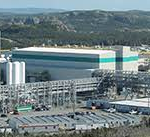 A strike at Vale SA’s operations in Sudbury, Canada, is disrupting the market for nickel, which is key to powering electric vehicles.
A strike at Vale SA’s operations in Sudbury, Canada, is disrupting the market for nickel, which is key to powering electric vehicles.
Sudbury is one of the world’s few producers of nickel pellets, a form used to make alloys for the aerospace, electronics and nuclear industries. Vale’s production in northeastern Ontario came to a halt when unionized workers went on strike June 1. The stoppage is prompting consumers to tap nickel battery briquettes as an alternative.
That shift is increasing competition for briquette, pushing up North American premiums, or the extra fees consumers pay as inventories of the metal dwindle. Inventories of briquettes, the main form of nickel stored in LME warehouses, are down 9% from their April peak and are now at their lowest in more than a year.
Nickel is a key ingredient in rechargeable batteries for electric vehicles, helping pack more energy into cells and allowing manufacturers to reduce the use of cobalt, a more expensive metal that typically has a less transparent supply chain. The market for that nickel is expected to be in tight balance over the next two to three years and could slip into a deficit as early as 2024.
Since the start of Vale’s strike, the premium on the briquette has risen 24% and U.S. prices on June 22 reached their highest level since November 2019. nickel for three-month delivery posted an 8% weekly gain last week on the LME, the largest since August 2019.
.gif) Loading
Loading

